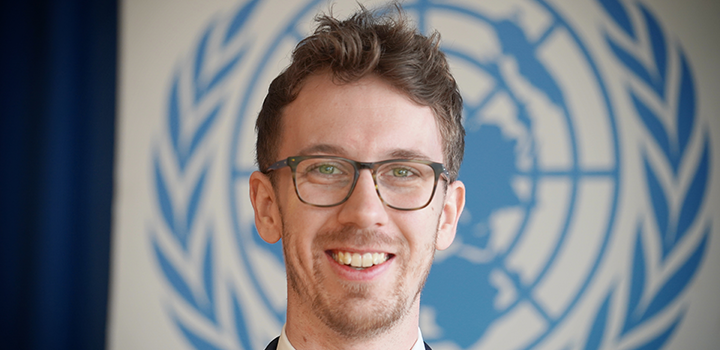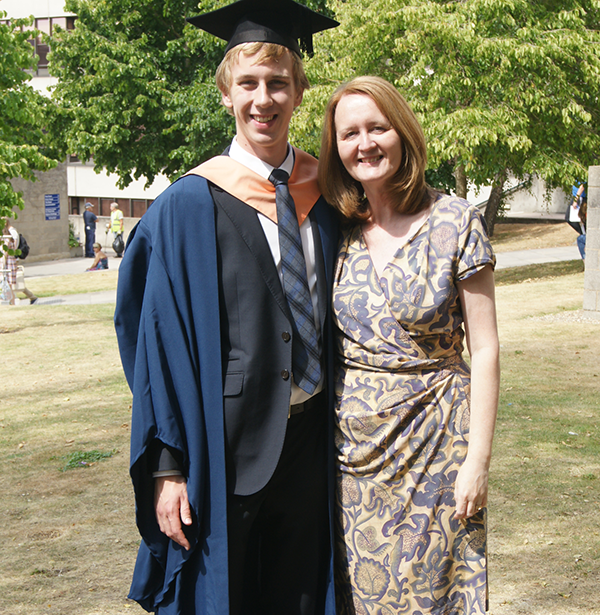Meet the UEA graduate helping to regulate outer space
By: Alumni Team

Andrew Peebles is the External Relations Officer within the UN Office for Outer Space Affairs (UNOOSA). He is based in Vienna, Austria, and works with governments from around the world to identify opportunities for international cooperation in the use of outer space. Andrew has worked with, and in, international organisations for a decade.
Andy graduated from UEA with a BA in History in 2013. He then completed a MA in EU Interdisciplinary Studies at the College of Europe in Natolin, Warsaw.
Tell us about your current role.
I'm the External Relations Officer within the UN Office for Outer Space Affairs in Vienna. My job is to drink lots of coffee with diplomats to understand their priorities for outer space and develop meaningful projects that allow countries and citizens to benefit from space policies, data, services, and technology. Working in diplomacy has taught me the power of the coffee corner and the rich history of Viennese coffee house culture. I’ve also become addicted to coffee.
Space, satellite imagery and communications have become increasingly critical in areas such as: responding to the aftermath of natural disasters, monitoring climate change, tele-education and medicine, sustainable farming, internet banking, international transport, and trade. Space is also a finite resource, and if there's a crash in space it can lead to a disastrous situation whereby, we lose those space services that we rely on for our everyday lives – whether that’s Google Maps, Tinder, Pokémon Go, or the GPS in your car.
Partnerships are one aspect of my job, as is mobilising donor funding, conceptualising projects, communicating, and working with countries to help them engage in international space meetings, such as the Committee on the Peaceful Uses of Outer Space (COPUOS). Over the last 60 years, diplomats, scientists and lawyers have come together in COPUOS to develop the global governance of outer space. Think of it as the Highway Code for space.
Over the last year, I’ve worked with the United Kingdom Space Agency on a project that helps countries register satellites. As a comparison… if you have a car, then you need to know who it belongs to and who’s liable for any crashes. Registering satellites is sort of similar. If there’s a crash or somebody sells their satellite to another country or company, then the international community needs to know who has ownership.
I’ve also engaged on hot topics such as space sustainability, COP26/climate change, and diversity and inclusion.
How did you get into working in space?
I can say I love Star Trek, Star Wars, Stargate and Battlestar Galactica and lots of science fiction TV shows and films. They were my formative experiences in space before I got this job at the UN. Joking… or am I?
I was formerly employed by the British Embassy in Vienna working for the UK Delegation (diplomatic mission) to the Organization for Security and Cooperation in Europe (OSCE), where I focused on human rights and communications. Then, I worked for the UK Mission to the United Nations on space issues, as well as drugs, crime, modern slavery, smuggling of migrants, ballistic missile proliferation, and arms export controls.
It is only recently that the UK Foreign, Commonwealth and Development Office (FCDO) started funding Junior Professional Officer (JPOs) positions around the world, mainly within international organizations and in niche areas. The FCDO funded a position in UNOOSA. The opportunity arose. Whilst I loved working for the UK, and negotiating international soft law, I also love being an international civil servant. This allows me to work globally with all countries, cultures, and backgrounds to develop meaningful projects.
Did you imagine that you might have a career like yours when studying history at UEA?
The approach I took at the time, which I still take now with every job I have, is that it’s not necessarily about the subject, it's about the transferable skills that the subject teaches you.
History gave me a huge set of transferable skills, including research, analysis, critical thinking, and project management. In my second year at UEA, I did an internship at Brussels at the European Union through the East of England Regional Development Office. That internship opportunity exposed me to working across Europe, and I started thinking about how I could use history to leapfrog into different career paths.
Did you enjoy your time at UEA?
I absolutely loved it, and I'm still in contact with quite a few people with whom I lived in my first year. I fondly look back on every experience. They say the friends you make at university are friends for life, and that’s certainly been true for me.
What would you recommend students do if they’re interested in working for an international organisation?
I always recommend trying to get an internship, but also - use your professors. They’re travelling the world and go to different conferences, workshops, and seminars. They have contacts and sometimes it's just a matter of having a relationship with a professor who knows of an opportunity for you and who can point you in the right direction. I came from a working-class background in Teesside. I didn’t have a network of professional contacts, and university really helped me to get a step on the ladder. Coming from Teesside and coming from a family of coal miners, factory workers, dinner ladies and council workers, I have to be honest and say that I never imagined working outside the North-East of England, let alone internationally. I am grateful to everybody that has supported me on the way, including my professors and the staff at UEA.
Do you think it’s essential to speak a second language when working on the continent?
I studied French at GCSE-level and I was trés mal, but it wasn’t until I did my master’s at the College of Europe in Warsaw that I regularly spoke French. The course was focused on the European Union's economy, political science, and foreign policy. The university had exams in French, so I had to quickly become proficient. I’ve now been in Vienna for nine years and my German is slowly coming along.
I can say that in my experience of working in international organisations, a foreign language is always welcome, but it is normally a bonus. The everyday working language for most of my jobs has been English, but learning a language helps you see and hear the world from a different perspective.
Andrew studied BA History at UEA from 2010-13.
Watch a video interview with Andrew, courtesy of the British Embassy & UK Mission to the UN in Vienna, to see what working at UNOOSA is like. This video is part of the #ViennaOpportunities campaign which you can follow here: @UKMissionVienna
To know more about the work of UNOOSA, check out @UNOOSA on Instagram, X, Facebook and LinkedIn.
